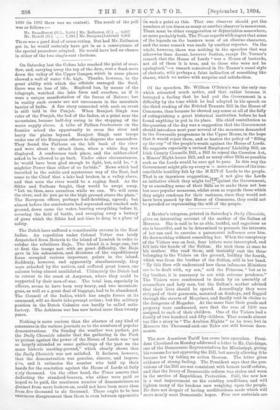Nothing is more curious than the absence of any kind
of consensus in the various journals as to the numbers of popular demonstrations. On Sunday the weather was perfect, yet the Daily Chronicle admits that the gathering in the Park to protest against the power of the House of Lords was " not so largely attended as some gatherings of the past on the same historic meeting-ground," which clearly shows that the Daily Chronicle was not satisfied. It declares, however, that the demonstration was genuine, sincere, and impres- sive, and it estimates the number who held up their hands for the resolution against the House of Lords at fully sixty thousand. On the other hand, the Times asserts that deducting the standard-bearers, who either were paid or hoped to be paid, the maximum number of demonstrators as distinct from mere lookers-on, could not have been more than from five thousand to six thousand. There ought to be less enormous disagreement than there is even between opponents on such a point as this, That one observer should put the numbers at ten times as many as another observer is monstrous. There must be either exaggeration or depreciation somewhere, or more probably both. The Times reports with regret that some- of the legends on the banners were of an obscene character, and the same remark was made by another reporter. On the whole, however, there was nothing in the speeches that was otherwise than decent, however fustian, except Dr. Tanner's remark that the House of Lords " was a House of bastards, not all of them it is true, and to those who were not he apologised,"—a remark conceived in Dr. Tanner's usual style- of rhetoric, with perhaps a faint indication of something like- shame, which we notice with surprise and satisfaction.


































 Previous page
Previous page